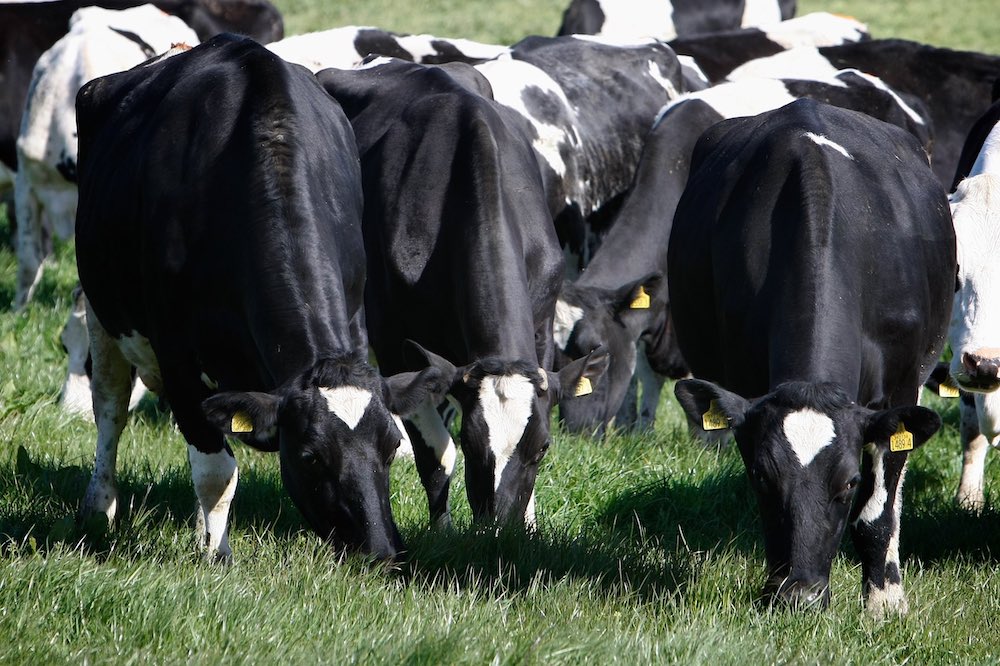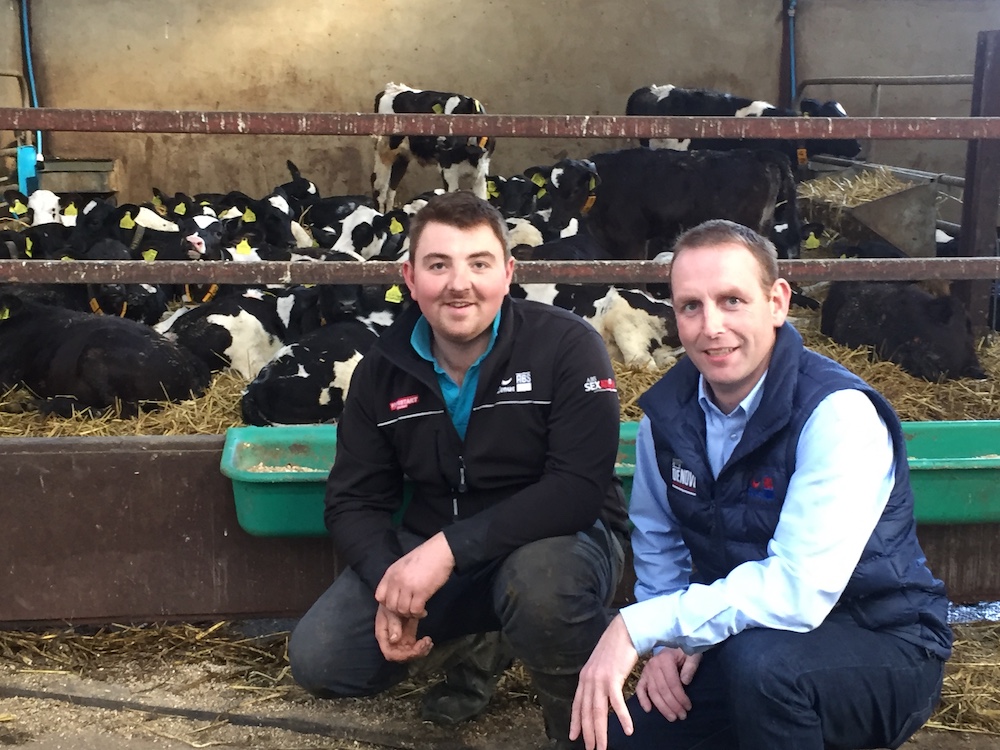Index
Dairy/Genetics
One year on from the launch of RMS Optimise
 In July 2019, Simon Logan, RMS Manager with Genus ABS in Northern Ireland, posed the question "As a dairy farmer would you prefer to be in the average Northern Ireland bracket with a 13% pregnancy rate or in the RMS Optimise bracket where the average is 21%? What difference would it make to your enterprise?
In July 2019, Simon Logan, RMS Manager with Genus ABS in Northern Ireland, posed the question "As a dairy farmer would you prefer to be in the average Northern Ireland bracket with a 13% pregnancy rate or in the RMS Optimise bracket where the average is 21%? What difference would it make to your enterprise?
In July 2020 Doris Leeman spoke to David McGregor, who farms 130 cows on robots near Antrim and was one of the first farmers to take on the new system of genetic improvement. He explained " We had two reasons for starting the RMS Optimise Program. Firstly, we knew from experience, that Genus ABS had the expertise to provide the service and the bull stud to back up the genetics. Secondly, my son, who had been heavily involved with the fertility program in the herd, was starting up Tinto Farm Vets, a new veterinary practice in Scotland, so his focus was moving to that business venture. We started to investigate the options. Gareth Bell, breeding advisor with Genus ABS suggested RMS Optimise. We studied the system in depth and decided that it fitted in with our plans for the dairy enterprise."
David outlined his experience with the RMS Optimise program " The Technician, Michael Scott, calls at the same time everyday to detect cows on heat and ensures they are mated with the appropriate genetics for our overall aims for the herd and the cow's individual genetic requirements. In addition he looks after all the paperwork, providing detailed fertility reports which enable us to ensure that our feeding program, compiled by David from FarmGate Nutrition, complements our overall aims for the herd."
David emphasised " A successful dairy enterprise needs a team effort, with input from breeding adviser, nutritionist, vet etc. and Genus ABS takes account of all aspects when advising on our breeding program."
The net result has been a decrease of nearly 50 days off our calving interval which now has a projected calving interval of 383 days. Milk yield has increased from 34 litres per day up to 39 litres at present. Our pregnancy rate has improved greatly we are now hitting 25%".
Simon Logan, explains "Pregnancy rate is the measure of how fast your herd is becoming pregnant and is your conception rate multiplied by your submission rate. Basically, the UK average is around 13%. David and Chris have almost doubled this in their first year of RMS Optimise which is a fantastic achievement".
David added "We have more milk in the tank and less cows culled due to infertility and so we have been able to sell surplus heifers and generated more income. We have also generated quite a few British blue calves not to mention a lot of valuable Sexcel pregnancies".
Simon Logan emphasised that the new RMS Optimise program has many more additional benefits. He explained "Farmers who utilise this program can create 67% of pregnancies with easy calving British Blue sires which should produce a cash crop of high value calves. All of the benefits will, in turn, mean increased milk production and pregnancy rates, a decreased calving interval, minimise the number of low value Holstein male calves and provide detailed management reports.
He added "In our first year of launching the Optimise service we had 19 customers all coming on for various reasons. It has been exciting to be a part of something that has really helped a lot of our customers. We have had 13 years of providing the RMS service in Northern Ireland and it now includes almost 40,000 cows improving the fertility and management of these herds. RMS Optimise further enhances this service and, in turn, the financial performance of the farm. We have had a lot of interest in the service and are aiming to accommodate more customers, although space will be limited so please contact your local Genus ABS representative for a free on farm consultation".
Photography by Columba O'Hare
Sexcel Excels
 Milk price, forage yields and concentrate feed prices are very often the major talking points with farmers. However, the ability to maximize milk yields through great fertility results whilst also minimizing the number of Holstein bull calves would surely be a great topic of conversation for any dairy farmer.
Milk price, forage yields and concentrate feed prices are very often the major talking points with farmers. However, the ability to maximize milk yields through great fertility results whilst also minimizing the number of Holstein bull calves would surely be a great topic of conversation for any dairy farmer.
12 years ago, the McRoberts family, who run a 250 cow herd at Blackskull Co. Down alongside a large agricultural contracting business, decided to look more closely at the fertility in their herd and how it might be improved. The result was that they decided to join Genus ABS' Reproductive Management System (RMS). The ability to have all the cows AI bred was a boost to the business, so much so that 3years ago they decided to push a little further and use only sexed Holstein genetics alongside a beef programme. Thomas McRoberts felt that the decreasing value of Holstein bulls calves would be an ongoing issue and that they would try to maximise calf value with the implementation of quality Aberdeen Angus sires into the mix.
This decision proved to be a good fit for the farm and when Genus ABS launched its own sexing technology 2 years ago the results got even better.
Sexcel harnesses Genus ABS best genetics and is produced through a novel, proprietary technology for sexing bovine semen. This innovative technology does not subject the cells to the high pressures, electric currents and shear forces used to produce the sexed semen historically available to farmers. The result has been that the superior sexed genetics product has helped customers maximize their profitability in line with their individual economic herd goals.
Genus ABS have concentrated on developing a product with superior fertility. Gender skew rates as expected have been similar to other sexed products. Before Sexcel was brought to the marketplace it was rigorously tested in multiple environments. Data from ABS Global's Real World Database sourced from 37 million cows worldwide demonstrates that Sexcel achieves a 90 percent relative conception rate when compared to conventional semen and a higher conception rate than other sexed semen used by dairy farmers.
The McRoberts farm now does not use any conventional Holstein semen – it is all Sexcel semen and Aberdeen Angus beef semen. The aim is to have enough dairy heifers to maintain the herd, along with top notch Aberdeen Angus calves which are finished on farm and sold through the Aberdeen Angus scheme in conjunction with Foyle Meats. Thomas remarked that "the added value of these finished Aberdeen Angus calves is a real boost to cashflow especially during periods of lower milk prices".
Thomas explained "The difference between using conventional semen and Sexcel has been minimal. We still have been able to achieve a 21-day Pregnancy rate of 22% but without the production of low value Holstein bull calves. We discuss what animals are to be served using Sexcel along with the RMS technician to make sure that we are getting replacement heifers out of our best animals, while the quality Aberdeen Angus semen means I have crops of beef cattle which meet the high specifications of the Aberdeen Angus scheme."
Simon Logan, RMS Manager with Genus ABS outlines the advantages. "Improved heat detection and increased pregnancy rates are the first aspects that farmers on Genus ABS' Reproductive Management System (RMS) notice. This service involves a highly trained technician walking the cows every day, chalking and inseminating them but also using the comprehensive herd information to make more informed decisions. Couple these benefits with the use of the best Sexing technology on the market and it just makes great sense"
Photography by Columba O'Hare
Genomic test allows dairy farmers to select heifers based on disease risk
Zoetis has launched CLARIFIDE Plus™, the only genomic test to incorporate health and wellness traits in addition to the production traits delivered by standard testing.
CLARIFIDE Plus is the first available dairy genetic evaluation specifically designed for cow and calf wellness traits in Holstein and Jersey cattle in the UK.
For the first time, dairy farmers will be able to genomically select heifers based on their risk for developing:
- Mastitis
- Lameness
- Metritis
- Retained placenta
- Displaced abomasum
- Ketosis
Additionally, information will be available on the likelihood of their calves developing:
- Calf scours
- Calf mortality
- Calf respiratory disease
Dairy Wellness Profit Index
CLARIFIDE Plus includes a bespoke Dairy Wellness Profit IndexTM (DWP). DWP is based on lifetime productivity and health, giving an overall view as to how profitable a cow will be. Standard genomic testing allows for a prediction on an animal's potential, CLARIFIDE Plus gives a prediction on the ability for that animal to remain healthy and fulfil it's potential.
Zoetis vet Dr Dave Armstrong explained: "DWP incorporates production, reproduction, health, type and wellness making it ideal to base your cow selections on. You can use the wellness trait predictions within CLARIFIDE Plus to effectively predict future health performance."
Performance benefits
On UK farms, the difference in lifetime profitability between the top and bottom 10% of animals ranked by DWP is approximately £1029. When the top third of cows are compared with the bottom third for individual wellness traits there was;
- 38% less incidence of a retained placenta
- 76% less incidence of developing metritis
- 49% less incidence of getting lameness
- 49% less incidence of mastitis
Dr Armstrong added: "Selecting for traits that have an emphasis on health, longevity and wellness, allows producers to make decisions earlier and invest in raising healthy animals. Healthier cows stay in the herd longer and make a big difference in a herd's profitability.
"Cows selected using CLARIFIDE Plus are 106% more profitable over a lifetime compared to selecting by parent average1 and those in the top 25% are on average, more than twice as likely to stay healthy as cows in the bottom 25%," he said
It costs £2.31 a day or £1,819.012 on average to rear a dairy heifer replacement with the payback taking until the middle of her second lactation2. By predicting a heifer's ability and health earlier, farmers can manage the upfront costs by only keeping the heifers they want, keeping them in the herd longer and significantly increase their overall rate of genetic gain.
Genetic selection with CLARIFIDE Plus along with good herd management helps farmers to reach their herd health and profitability goals.
